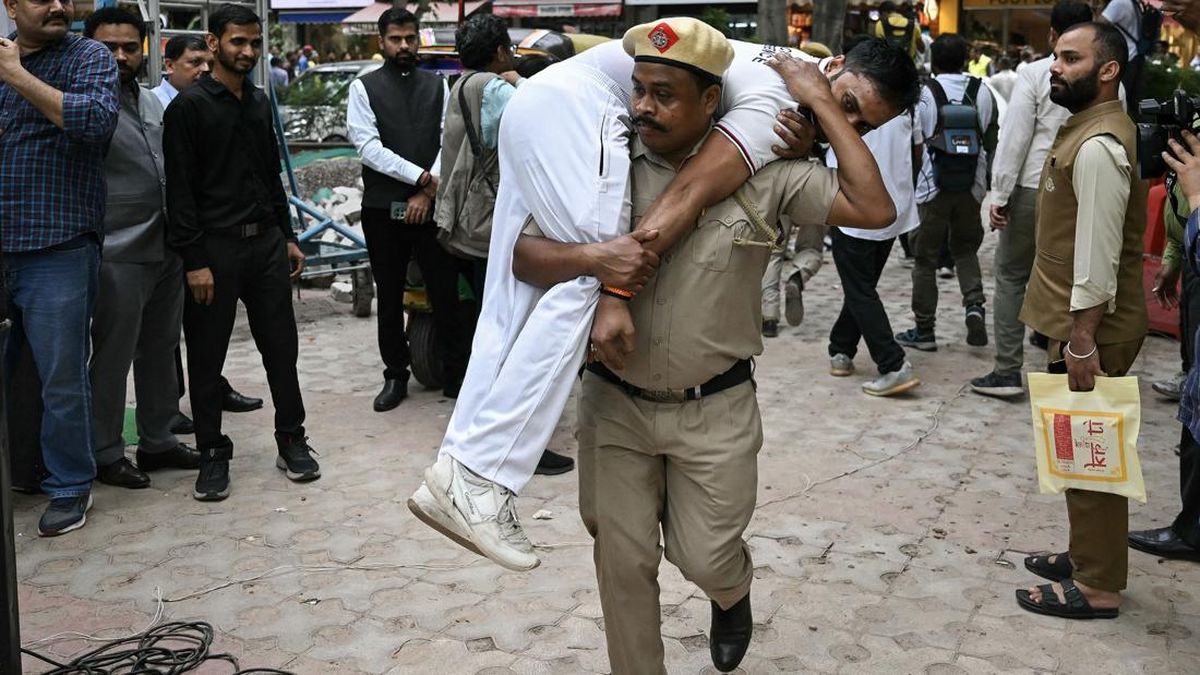
The French team Les Reines du Foot (dressed in red and white, they call themselves the "queens of soccer") take on the green-and-white-clad Vuka Soweto team (Vuka means "wake up" in Zulu) from South Africa's Johannesburg township. Les Reines du Foot went to lengths to fundraise for their trip to Tzaneen — from selling crepes at markets to posing nude for a calendar. Samantha Reinders for NPR hide caption
toggle caption
Samantha Reinders for NPR
TZANEEN, SOUTH AFRICA — The stands of the soccer stadium buzzed with anticipation. Vuvuzelas honked like a chorus of drunk geese, and spectators chattered excitedly. The teams were about to take the pitch.
But first, match officials had some business to attend to. They hunched over a stack of passports, carefully checking the teams' credentials. "We don't want to see underage players," one official explained gravely.
Welcome to the Grannies International Football Tournament, or GIFT, where you're never too old to play. But you may well be too young.

Rossina Mathye, 84 (center), was one of the original Vakhegula Vakhegula players — the name for the team from Tzaneen means "Grandmothers, Grandmothers." "Exercise is good for me," she says of her soccer career, which took her to the U.S. in 2010 to play in a special match for older women. Mathye, who has 10 grandchildren and is a great grandmother, no longer plays. "My knees are sore, so I stopped," she says. "Now I sit and watch. Now I'm one of their biggest supporters." Samantha Reinders for NPR hide caption
toggle caption
Samantha Reinders for NPR
Technically speaking, having grandchildren was optional, but the age requirement was strictly non-negotiable. Under 50? Go find your own stadium of adoring fans. This one was reserved for the nanas, the mamis, the vovos and the gogos.
And make no mistake: They came to compete.
Once the age checks were done, the opening bars to the FIFA anthem crackled through the stadium speakers, and the players filed onto the field, gripping the hands of the young local players escorting them. On one side stood Togo, dressed head to toe in highlighter yellow. On the other was the United States in white.
When the whistle blew, the Americans immediately surged forward. Within seconds, their left forward Pam Woodworth, 72, streaked past three Togolese defenders, white ponytail flopping. Before they could regroup, she fed the ball straight to the feet of her center forward, Sue "Clip" Clippinger, 78, who drove a hard, high shot into the left corner of the net. The crowd roared.

Sue "Clip" Clippinger, 78 (in the white t-shirt), is the center forward for the New England Breakers. She's flanked by players from team Togo. "We've got some of the best chemistry," Clippinger says of her team, adding "I've gotten better at this than when I was 40." Samantha Reinders for NPR hide caption
toggle caption
Samantha Reinders for NPR
"Goooooooaaaalllll," screamed the commentator, a former South African professional player named Ishmael Maluleke. "What a performance from Granny #4 of the USA. She's dangerous, I'm telling you, she is the USA's [Lionel] Messi."
For most of the women playing in this tournament, this was a kind of adoration they never dreamed of achieving on the soccer field. Whether they came from rural Kenya or suburban France, many had grown up in worlds where soccer was for the boys. As adults, they had often swallowed their own ambitions to make space for the people who needed them: spouses and partners, children, grandchildren.

"Grannies" were the stars of the field — and a big part of the crowd. The stadium was packed with gogos (the Zulu word for grandmothers, which is widely and affectionately used throughout southern Africa). Some brought their sewing along, some had a nap when needed, but all cheered loudly for their favorite teams.
Samantha Reinders for NPR
hide caption
toggle caption
Samantha Reinders for NPR

Dancers in traditional dress accompanied South Africa's Mbombela team at the opening ceremony of the grannies tournament, which involved a 15-minute walk from the home of tournament founder Beka Ntsanwisiz to the stadium. Samantha Reinders for NPR hide caption
toggle caption
Samantha Reinders for NPR
Now, however, they were making up for lost time. For four days in early April, teams from seven countries converged on this small South African farming town.
"We are going to play ball," sang one South African team in Zulu as they entered the stadium on the tournament's opening day. "The grannies are going to play soccer."

Pam Woodworth, Margot Rendall and Anne Snelling-Lee from the New England Breakers walk onto the field for their game against Togo's team Femme Foot. Youth from local soccer clubs held hands with players from each team as they made their way on to the field before each game. Samantha Reinders for NPR hide caption
toggle caption
Samantha Reinders for NPR
'One day I'm going to host the World Cup' — for grannies
Many of the teams who paraded into the stadium on that sticky, subtropical morning had traveled a great distance to be there. Two teams from Boston blinked back jetlag as they handed out mini American flags to the crowd. A French squad in blue tracksuits shuffled in behind a massive tricolore emblazoned with their team name: Les Reines du Foot. The queens of soccer.

Beka Ntsanwisi (fondly known as Mama Beka) is the local philanthropist who organized the first granny games to help her town's women improve their health. Above: Ntsanwisi, center, wearing the yellow jersey) is given a surprise birthday cake on the last day of the event, when she turned 57. Samantha Reinders for NPR hide caption
toggle caption
Samantha Reinders for NPR
But in many ways, few had come as far as the hometown team. In 2007, when a Tzaneen radio-host-turned-philanthropist named Beka Ntsanwisi, began organizing a soccer league for older women, the odds were stacked against her.
Rossina Mathye, now 84, played on one of those early squads. In those days, she would put on her soccer shorts for practice and then, before leaving her house, tie an ankle-length wrap skirt around her waist. "You see, in our culture … trousers are for men," she says. If the women wanted to play then "they" — the men — "musn't see what's going on."
As the gospel of granny soccer spread, its momentum became hard to contain. Teams sprouted in towns and villages across the region. In a nod to South Africa's beloved national teams, Bafana Bafana (Boys Boys) and Banyana Banyana (Girls Girls), the players called themselves Vakhegula Vakhegula — Grandmothers Grandmothers.

Beauty Mushwane, 72, a grandmother herself, is a proud supporter of the Tzaneen team —Vakhegula Vakhegula. She's cheering them on in their quarter final game against the New England Breakers. Samantha Reinders for NPR hide caption
toggle caption
Samantha Reinders for NPR
By the time South Africa hosted the World Cup in 2010, the Vakhegula were minor local celebrities. And their star was still rising. A few days after the final whistle, an all-star team of "grannies" boarded a flight for Boston. A group of American women had seen clips of them playing and invited them to compete in a tournament organized for older players.
Coming back from that trip, Ntsanwisi's head rattled with ideas. If Boston could host a championship like that, why not Tzaneen? Sure, it wasn't exactly an obvious choice — a scruffy farming town of about 15,000 people deep in pick-up truck country, boxed in on all sides by groves of orange and avocado trees, a 5 hour drive from the nearest major international airport in Johannesburg.
But then again, Ntsanwisi had built a soccer league from scratch, and now her players were traveling the world. Nothing felt impossible. So she made herself a promise. "One day," she said, "I'm going to host the World Cup." For grannies, that is.
'We didn't want to give up'
It took a decade, but in 2023, the inaugural GIFT kicked off at the soccer stadium down the road from Ntsanwisi's childhood home in the Tzaneen township of Nkowankowa, featuring teams from six countries.
The second edition of the Grannies International tourney in 2025 looked poised to be even bigger. Besides the Americans, the French, the Togolese and a dozen South African squads, teams from Kenya and Mozambique marched into Nkowankowa Stadium the first morning of the tournament.
But one team was missing.

After their bus broke down en route to the tournament, team Zambia hitchhiked to the stadium. Above: The team warms up after their delayed arrival.
Samantha Reinders for NPR
hide caption
toggle caption
Samantha Reinders for NPR
As the opening ceremony began with a flurry of speeches, the bus carrying Team Zambia lurched to a stop by the side of the road in southern Zimbabwe, 200 miles away.
For more than 48 hours, captain Lillian Zungu had been trying to keep her squad's spirits high despite mounting obstacles. First, two days before the tournament, the bus organized by the Zambian government had set out several hours late. By the time they reached the border with Zimbabwe that night, it was closed.
With little other choice, the players slept in the bus. Another day passed driving through Zimbabwe, then another night. By the time they awoke on the third day — the first day of the tournament – "we felt we are losing it, but we didn't want to give up," recalls Zungu, 54, and a chef by profession.
But now, less than an hour's drive from the South African border, it seemed their bus had done the giving up for them. It had broken down.

Lillian Zungu (in blue), is the captain of the Zambian team (and a professional chef). When the team bus petered out en route to the tournament, she says, "We felt we are losing it, but we didn't want to give up." Above: Zungu jumps on a teammate's back to celebrate a win. Samantha Reinders for NPR hide caption
toggle caption
Samantha Reinders for NPR
Zungu tried not to think of what could have been. In the months leading up to the tournament, her team had practiced together four times a week. The players were small and fast, with the quick footwork and breakaway speed to match. Watching them play together, Zungu swelled with pride. At times, she couldn't suppress a thought: Maybe they were good enough to win the whole thing.
But none of that mattered now. The tournament didn't care how hard they'd trained, and it certainly wasn't going to wait for them to find a mechanic in rural Zimbabwe. With stiff limbs, players descended from the bus.
One of the coaches stuck out his thumb.
'The Maradona of France'
Back in Nkowankowa, the matches got underway. After a nail biter 1-0 victory over Kenya, a team from South Africa threw their goalkeeper on their shoulders and carried her across the field, cheering. Maluleke, the former men's professional player, fired off commentary at the speed and cadence of an auctioneer. "We're seeing the Maradona of France play today," he screamed during one match.

Laurance Gonzalez, 58, a player on the French team Les Zamies Foot, shows off her footwork. Gonzalez, pictured above in the foreground, wearing blue and white) won the award for best overall player at the tournament. Samantha Reinders for NPR hide caption
toggle caption
Samantha Reinders for NPR
"We say, these women are getting old, they can no longer do certain things, let's leave them," says Honorine Kobara Adjoa, the captain of Femme Foot Togo. "But here they are giving everything of themselves. Being here, it's so motivating."
Here, for the first time, she was surrounded by soccer-playing women from all over the world. And all of them seemed to share the same wonder she felt, even if they often had few words in common to express it.

The Thulamahashe Grannies, a South African team, host a players into the air after their 1-0 victory over Kenya's Mutei Grannies. Samantha Reinders for NPR hide caption
toggle caption
Samantha Reinders for NPR
But there were other shared languages. After games, players pulled their opponents into sweaty hugs. In the stands, they scrunched together for selfies like teenagers. Every so often, one of the South African teams would spontaneously burst into song, dragging everyone in earshot into an impromptu dance party.
"Once one person starts dancing, everybody tries to follow the dance," says Deb Keohan, the captain of the New England Breakers, an offshoot of the American squad that had invited Vakhegula Vakhegula to Boston a decade before. "And then we were all dancing together. We didn't speak any language in common other than dancing."

The Mutei Grannies from Kenya celebrate at the end of their game with the French team Le Reines du Foot — the first of the tournament's quarter finals. After the match, both teams embraced. Samantha Reinders for NPR hide caption
toggle caption
Samantha Reinders for NPR
For many of the players, soccer had also been there at other moments when words failed them. After deaths and divorces, through illness and financial uncertainty, the game was something they could disappear into when the world felt like it was collapsing around them.
When Mathye, the player from the original Vakhegula Vakhegula squad, lost her oldest son in 2015, she sat at home tormented, unable to escape his memory. But when she stepped onto a soccer field, for a few minutes the game shoved her sorrow offstage. Playing demanded her full attention, body and mind.
"You see the ball," she said, "not the trouble."
'Why I am a strong woman'
In the grandstands in Nkowankowa, few people had to be told the importance of grandmothers.
On the third day of the tournament, I met Muhluri Mayimele, 17, and her friends. She told me she was a soccer player herself, and hoped to learn some new moves from the players. When I asked about Mayimele's own grandmother, the teenager explained that she lived with her, and "she teaches me life."
Mayimele is hardly an outlier. Approximately 40% of all South African children live with their grandparents according to government statistics from 2023, some 10 million in total.
Hidden inside those numbers is a long and painful history. For generations, Black South Africans lived under racist regimes that viewed them as little more than disposable cheap labor. Confined to impoverished villages and townships, many left home seeking jobs in "white" cities and towns.
Men frequently went to work in the country's booming gold mines. But women's work was typically domestic. They cleaned, cooked, and raised other people's children, while at home, their own mothers raised theirs.
Fikile Sithole, who was raised by her gogo from the age of 7, says there was no more important person in her childhood. Her granny was "a mother, a father, [and] a grandmother at the same time." And when Sithole wanted to join a boys' soccer team in her neighborhood in Soweto, near Johannesburg, her grandmother didn't tell her that wasn't what girls did. She supported her.
Sithole went on to be part of the first women's national team in a democratic South Africa in the 1990s, an accomplishment she credits to the woman who raised her. She is "why I am where I am today," she explained. "Why I am a strong woman."

The Mbombela Gogos celebrate after beating the Zambia Grannies. [SO THEIR TEAM IS CALLED GRANNIES?] Samantha Reinders for NPR hide caption
toggle caption
Samantha Reinders for NPR
Now in her mid-50s, Sithole is still playing. In the Grannies International, her team, the Mbombela Gogos, stormed its way to the semi-finals with a style of dance-like footwork and short, quick passes known in South Africa as "shoeshine and piano."
"We play, we move, we travel," she said. "It's going to take us a long time to get old."
'I love my team because we don't give up'
On the final afternoon of the tournament, a row of trophies stood at attention on a table at midfield.
One by one, an announcer began calling up the women whose play had marked the tournament — its top goal scorer, its most promising player. Then he came to the award for the top midfielder.

Nomsa Mashego, a 58-year-old grandmother of 2, is a member of South Africa's Mbombela team. She won the "most promising player of the tournament." Mashego has been playing soccer for 10 years. In 2006 she was partially paralyzed after a stroke and she says that her arms and leg are now 100% "because I play ball." Thinking of her own mortality, she says, "It's better to play ball than go to ground," she says. Samantha Reinders for NPR hide caption
toggle caption
Samantha Reinders for NPR
"It's Lillian from Zambia!" he exclaimed, and suddenly the entire Zambian squad was on its feet. There they were: the team that almost didn't make it at all, yelling their lungs out for the woman who had been their playmaker, on and off the field.
After hitching rides to the border in passing mini-bus taxis, the team had arrived in Tzaneen at 10 p.m. on the first day of play, long after their scheduled match. But the organizers agreed to squeeze the game in the following morning, and the show went on.
The Zambians played two hard-fought games and narrowly missed out on a quarterfinal berth.

Members of the Boston Breakers hoist the trophy after beating the French team "Les Zamies" in a penalty shootout. Samantha Reinders for NPR hide caption
toggle caption
Samantha Reinders for NPR
It was the New England Breakers who took the cup, defeating Les Zamies from France in soccer's most heartbreaking tie-breaker, a penalty shoot-out.
But team Zambia celebrated its own triumph.
"We are happy that we didn't give up," Zungu said. "I love my team because we don't give up."

 2 months ago
30
2 months ago
30















































